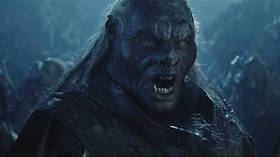Netflix’s ‘Hollywood’ is a liberal fantasy that erases history and undermines progressive goals

Netflix mini-series Hollywood wants to vindicate marginalized strugglers who tried to make it big in the movie industry in the mid-20th century. Instead, its alt-history devalues decades of real struggle.
In the Netflix show ‘Hollywood’, Raymond Ainsley, an aspiring director, tries to make a name for himself in Tinseltown circa 1947 – a city in which racial prejudice and homophobia are entrenched. Ainsley is hired to tell the story of Peg Entwistle, the real-life 24-year-old actress who jumped to her death from the Hollywood sign and thereby became a tragic symbol of the callousness of the movie industry.
Ainsley convinces the studio to cast his black girlfriend in the lead, despite the threat of theaters in the South pulling all of its movies if it releases a film starring an actress of colour. Since the real-life Peg Entwistle was white, the producers of ‘Hollywood’ have changed the protagonist’s name from Peg to Meg. The series then adds a second element of alternate reality, exploring a scenario in which the young star hadn’t leapt from the sign.
Though certain to have faced insurmountable obstacles to making such a movie at the time, the characters in this reimagining refuse to back down, and the film is commissioned, eventually triumphing both at the box office and the Academy Awards. At this point, the show crowbars in a reimagined fate for another marginalized star of the time, Anna May Wong, an Asian American actress whose Hollywood career was hampered by her refusal to play stereotypical roles. And, finally, another character uses his acceptance speech to come out of the closet, publicly attesting to his love for his boyfriend, the then-unknown Rock Hudson. The series concludes with scenes a year after the narrative, when the defiant public declaration of love has had a transformative effect and gay men are no longer ashamed of their sexuality.
‘Hollywood’s co-creator, Ryan Murphy, has stated in interviews that he wanted the show to give a happy ending to those who didn’t get one in real life. While this might be a well-intentioned impulse, the way to do it is in a necessarily bittersweet way: we allow time and the retrospective view of a more enlightened age to give such people the happy ending of a restored and celebrated life. We acknowledge that history can’t be changed, but that our appreciation can evolve, and due recognition can be given. That’s what cultural martyrdom has always involved.
In vastly contracting the span of time in which generations of entrenched bigotry are overcome, ‘Hollywood’ is being both obtuse and indulgent, failing to give a proper sense of the prevailing reactionary culture. Moreover, it carries the cavalier implication that the real-life, progressively minded people of Hollywood might also have had the same success as the characters in the series, had they only been as audacious. In indulgently portraying fantasy characters who empower themselves in a modern way, the show distorts and undermines the agency of those who actually advocated for change – their risks and setbacks, their delayed and partial victories, the choices of those who decided to remain quiet and camouflaged to prevent their career being wrecked.
There is a further, indulgent implication about the entertainment industry’s ability to be a precursor to, or to engender social change through the power of cultural representation.
Also on rt.com ‘A problematic white savior flick’: Starved & desperate woke mobs target Netflix’s ‘Extraction’ starring Chris HemsworthAs good as censorship
Today’s entertainment industry, with its faux-progressive agenda, has been increasingly altering material from the past. Recently, Twitter lost its collective mind when viewers of the 80s film ‘Splash’ on Disney+ noticed that Daryl Hannah’s bare butt had been digitally censored. As Hannah’s mermaid cavorts away from Tom Hanks back into the ocean, the top part of her hair swishes about while the newly added digital hair seems affixed to her buttocks.
In the modern age of film and television, the integrity of a ‘finished product’ is becoming increasingly frayed. The Star Wars film ‘A New Hope’ experienced several iterations of post-release re-edits in the infamous ‘Han shot first’ controversy, after George Lucas decided he didn’t want Solo to come across as a “cold-blooded killer.” Likewise, the remastered version of ‘E.T.’ was altered to feel and look tonally softer by, for instance, removing the guns that had been in the hands of the policemen chasing the bicycle-riding kids in an iconic scene.
Making such alterations to appease the sensibilities of a modern audience, is not a robust, intellectual form of liberalism. Sanitizing content that is deemed ‘problematic’ because social norms have changed prevents audiences from engaging with the film and ascertaining for themselves why it doesn’t hold up. It patronizes them, implying they can’t see material in its historical context and still enjoy it as entertainment.
Coherent and strong liberalism advocates for creative expression that is appealing for its own sake, but also uninhibited in its exploration of subject matter and its pursuit of truth about the human experience. Censorship – with its relation to repression, is anathema to ideal liberalism. And yet, for many years now, major studios have been allowing their films to be compromised, altering them to make them acceptable overseas, particularly in the lucrative Chinese market. Marvel reinterpreted the traditional look of The Mandarin, the antagonist in the third ‘Iron Man’ film, and whitewashed the character of The Ancient One in ‘Doctor Strange’ to appease the Chinese censors. In the Western release of the Bond film ‘Skyfall,’ there are several scenes in which 007 defeats men of Chinese origin. These scenes are entirely absent from the Chinese cut of the film.
The definition of what constitutes a definitive movie has started to change. There ought to be an emphasis on maintaining the integrity of original works. Disney should continue with its practice of placing classics on the Disney+ service in their original form, with disclaimers that they “may contain outdated cultural depictions.” This manages the balancing act of mollifying sensitive modern viewers, while respecting the integrity, and cultural and historical context. Makers of shows such as Hollywood ought to respect the sacrifices of those who advocated for change in the past by not indulgently reimagining and dragging askew such social battles in an ill-conceived homage to the martyrs and pioneers who fought them.
Like this story? Share it with a friend!
The statements, views and opinions expressed in this column are solely those of the author and do not necessarily represent those of RT.














